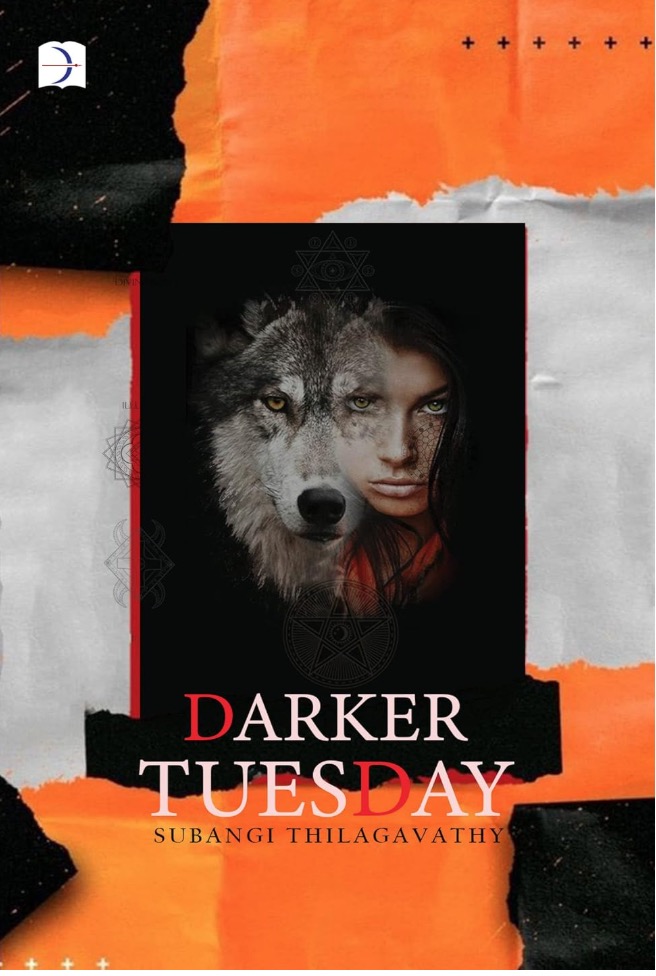 ⚘️ Book Name: Darker Tuesday
⚘️ Book Name: Darker Tuesday
⚘️ Author: Subanji Thilagavathy
⚘️ Pages: 144
⚘️ Type: Fantasy Thriller
Spoiler alert: The following review discusses key plot points, including the ending.
Subanji Thilagavathy’s Darker Tuesday is a compact, women‑centred fantasy thriller that blends police‑procedural urgency with folkloric horror. At its heart is Ivana, a young woman whose life fractures across one unforgettable night. The opening is arresting: Ivana vaults a ten‑foot compound wall to escape her own home, leaving behind a room that reeks of something feral—foul odours, claw‑marks, and the unmistakable impression that human logic has slipped. Her grandmother, shaken, alerts Ivana’s parents, Arpana and Ragu, who are working in the Gulf, while Officer Amar and his confidante Akshara begin an investigation that starts like a missing‑person case and quickly turns stranger.
As Amar and Akshara peel back layers, the novel pivots from mystery to myth. We learn Ivana has fled to Australia, searching for a way to reverse a werewolf curse triggered by accident rather than choice. This shift of setting serves the story well: distance raises the stakes, and the cross‑continental chase mirrors Ivana’s own dislocation—between self and shadow, daughter and danger. Arpana and Ragu follow, as do supporting figures—Granny, Constable Fernando, SI Kadhir—each a small but distinct thread in the wider tapestry.
The middle acts carry the book’s strongest momentum. Thilagavathy balances bite‑size investigative beats with glimpses of Ivana’s inner conflict, suggesting a creature who is not a villain but a victim of circumstance, biology, or fate—depending on how you read the lore. The series of animal attacks in Australia tilts suspicion toward Ivana, and the narrative’s tension isn’t just whether she did it, but whether “she” is still she when the moon calls. The author’s choice to keep the transformations impressionistic rather than graphically explicit is effective; it preserves horror’s mystery while keeping focus on emotion and consequence.
The climax is both tragic and thematically coherent. Cornered by police, Ivana interposes herself to shield her mother from gunfire—an act of love that costs her life and, in the same sequence, takes her father from her forever. The ending then turns one final screw: Arpana begins to change, the curse crossing generational lines like grief itself. That last image re‑frames the book not only as a thriller, but also as a parable about inheritance—of love, guilt, and wounds we do not choose.
What works well
-
Women at the centre: Ivana and Arpana anchor the story. Akshara’s role as an investigator and moral counterweight also stands out, keeping the narrative grounded even as the supernatural swells.
-
Pace and structure: At 144 pages, the book moves briskly. Chapters clip forward with clear objectives—search, discovery, pursuit, confrontation—making it hard to put down.
-
Myth as metaphor: The werewolf element reads as a lens on identity, mental health, or concealed trauma. The “accidental curse” motif invites empathy over condemnation.
Where it could go deeper
-
Motivations in the finale: The question that lingers—why does Ivana spare the mother but not the father?—is powerful. The text seems to invite multiple readings:
-
Instinctive protection: In her last lucid moment, Ivana protects the parent she associates with care; the father’s death is a collateral tragedy, not a targeted choice.
-
Guilt and grace: Ivana may believe Arpana can carry the story forward and forgive; sparing her becomes an act of atonement.
-
Cycle of inheritance: By preserving the mother, the curse passes on—suggesting that love itself becomes the conduit of fate.
If the ambiguity is deliberate, it works; if not, a few clearer emotional beats for Ragu could heighten the impact.
-
Verdict
Darker Tuesday is lean, moody, and memorable—an atmospheric thriller where the chase is exciting, the lore is suggestive rather than over‑explained, and the women are written with agency and heart. It’s the rare werewolf tale that prioritizes consequence over spectacle, and it leaves you turning the last page with the right kind of ache. The final image—Arpana’s slow, dawning change—lingers like a chill. And yes, the nagging question remains: Why mother and not father? The book’s strength is that it lets you answer, and live with, that darkness.
